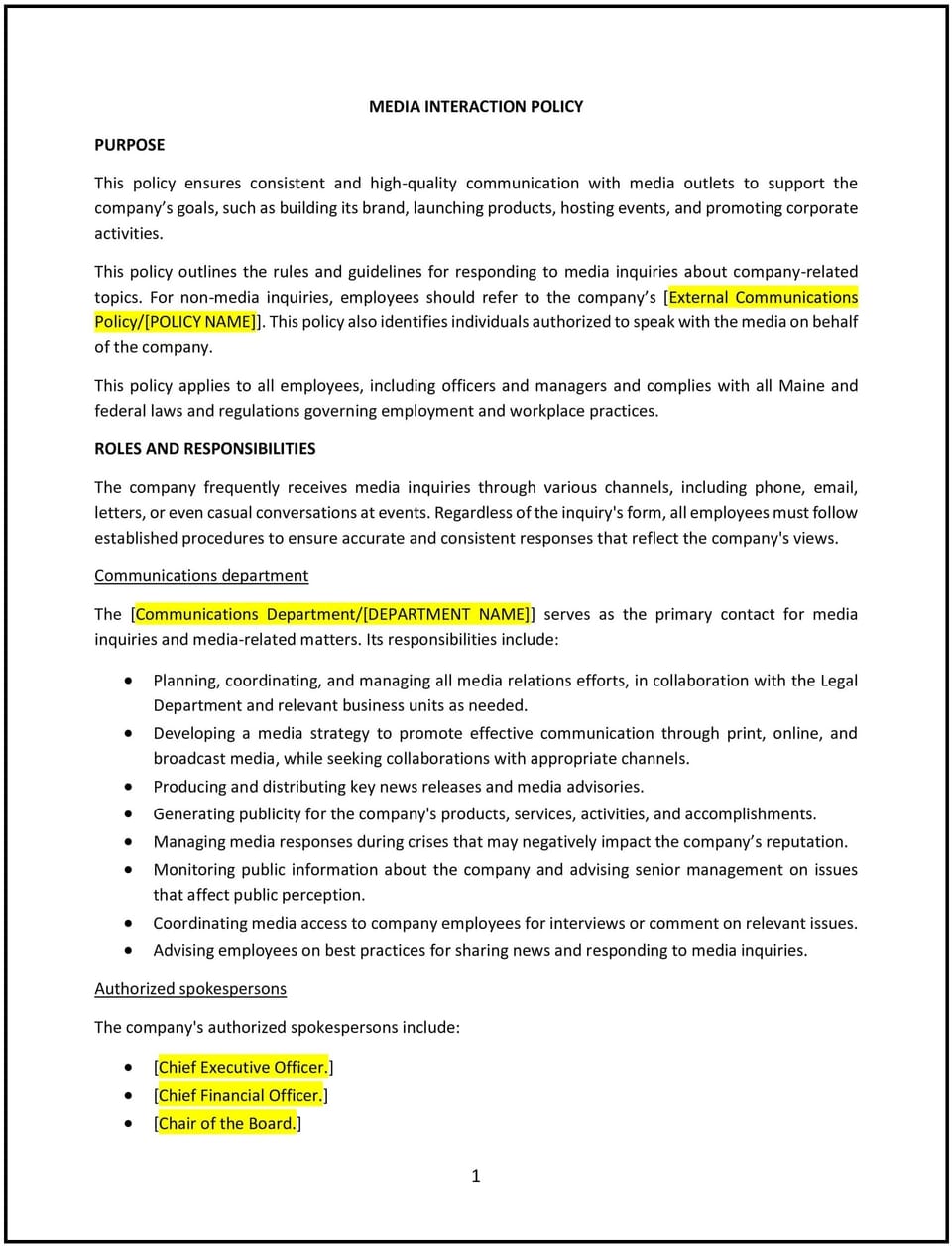Media relations policy (Maine): Free template

Media relations policy (Maine): Free template
This media relations policy is designed to help Maine businesses manage interactions with the media and ensure consistent, accurate, and professional communication. It outlines the procedures for handling media inquiries, issuing statements, and protecting the business’s reputation while supporting compliance with state and federal regulations.
By implementing this policy, Maine businesses can maintain control over their public image, respond to media inquiries efficiently, and ensure that all external communications align with organizational goals.
How to use this media relations policy (Maine)
- Define the scope: Specify that the policy applies to all employees and representatives when engaging with the media, including journalists, bloggers, and influencers.
- Identify authorized spokespeople: Designate individuals who are authorized to speak to the media, such as senior management, public relations personnel, or designated employees.
- Establish communication procedures: Provide a clear process for handling media inquiries, including how to direct requests to the appropriate spokesperson.
- Address media releases: Detail the procedures for preparing and distributing official statements, press releases, or public announcements, ensuring they are approved by relevant stakeholders.
- Protect sensitive information: Establish guidelines for handling confidential or proprietary information, and specify what can and cannot be shared with the media.
- Include crisis communication protocols: Define steps for responding to a crisis or emergency, including rapid response strategies and coordinated messaging.
- Review regularly: Update the policy to reflect changes in the media landscape, business operations, or Maine regulations.
Benefits of using this media relations policy (Maine)
Implementing this policy provides several benefits for Maine businesses:
- Protects reputation: Ensures consistent and accurate messaging, reducing the risk of miscommunication or damaging the business’s image.
- Enhances media relations: Builds positive, professional relationships with media outlets and influencers.
- Promotes consistency: Ensures all external communications align with business values, objectives, and legal requirements.
- Improves crisis management: Provides clear protocols for managing media interactions during emergencies or controversies.
- Supports transparency: Provides a structured approach for addressing public questions and concerns in a timely manner.
Tips for using this media relations policy (Maine)
- Train employees: Provide training for employees on how to handle media inquiries, emphasizing the importance of directing inquiries to authorized spokespersons.
- Be proactive: Regularly update the media with relevant news, announcements, or initiatives to foster a positive relationship.
- Monitor media coverage: Keep track of media mentions and respond quickly to misrepresentations or inaccuracies.
- Use templates: Develop standardized templates for press releases or statements to streamline the communication process.
- Stay consistent: Ensure all spokespeople adhere to the messaging guidelines and tone outlined in the policy.
- Stay informed: Monitor changes in Maine laws, media practices, or industry trends to ensure the policy remains effective.
Q: Who is authorized to speak to the media under this policy?
A: Only designated individuals, such as senior management or public relations personnel, are authorized to speak to the media.
Q: How should employees handle media inquiries?
A: Employees should direct all media inquiries to the designated spokesperson and not provide any official statements without approval.
Q: How often should businesses review their media relations policy?
A: Businesses should review the policy annually or whenever there are updates to media laws or communication practices.
Q: How should businesses handle sensitive or confidential information when speaking with the media?
A: Businesses should establish clear guidelines for what information can be shared publicly, and ensure that sensitive or proprietary details remain confidential.
Q: How can businesses respond to media crises or emergencies?
A: The policy should include specific crisis communication protocols, such as preparing timely and consistent statements, coordinating responses with key stakeholders, and managing the flow of information.
Q: How can businesses ensure consistent messaging across media channels?
A: Businesses should provide spokespeople with clear guidelines and templates for key messages, ensuring all communications are aligned with company values.
Q: How can businesses build positive relationships with the media?
A: Businesses can regularly engage with journalists, provide accurate information, and offer expert insights on relevant topics to build trust and foster goodwill.
This article contains general legal information and does not contain legal advice. Cobrief is not a law firm or a substitute for an attorney or law firm. The law is complex and changes often. For legal advice, please ask a lawyer.


